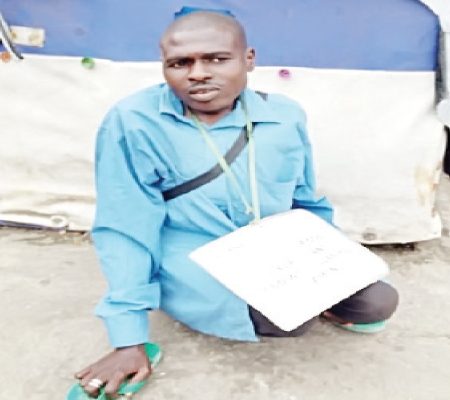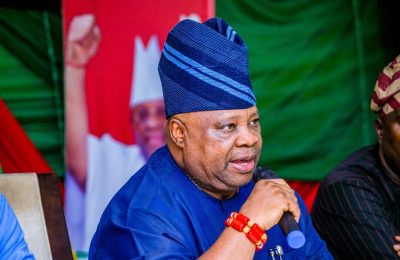
The location is the popular Igbudu Market in Warri, Delta State. He wore a long-sleeve blue shirt and a green lanyard with an ID card around his neck. His expression was solemn and a bit weary. With his short and neatly trimmed hair, he was conspicuously holding a white cardboard sign with black text that read: “PLEASE HELP ME FOR WHAT TO EAT BECAUSE OF GOD HELP ME AND GOD WILL BLESS YOU AMEN.”
He was wearing green plastic flip-flops on his palms, with one visible on his foot and another lying beside him. Around him were some people, seated, involved in various activities, visibly oblivious of his presence.

This was the state of Alhaji Yusuf, a man of resilience and many existential struggles. Born in Jigawa State and raised in the face of hardship, Yusuf, who’s in his late 30s, told a story of endurance, losses, and the will to survive in a society that has long overlooked his plight.
Though confined to a stool with tyres which he uses to navigate around in his begging career, Yusuf lamented to our correspondent how the current economic hardship in Nigeria has left him trapped, unable to secure a future for himself and family.
Yusuf was born with a physical disability that restricts his movement. Growing up, he faced daily difficulties that can be scarcely imagined. Unable to walk and often needing help even for the simplest of tasks, he became intimately familiar with the obstacles of life from a tender age.
As a teenager, he had scraped together his earnings from a modest shoe-polishing job outside the local mosque to buy a wheelbarrow. In an effort to gain some financial freedom, he started selling pineapples, his first attempt at a sustainable livelihood.
His friend, a little boy, would push Yusuf’s wheelbarrow while he balanced the fruit to keep it from spilling. Every naira he made, Yusuf would split it with his young helper as payment for the boy’s dedication and effort. For almost five years, this small fruit trade brought Yusuf a sense of purpose and a taste of self-sufficiency. But as the years went by, rising costs and dwindling earnings forced him to give up his business dreams.
Yusuf, who has a wife and a two-year-old son, narrates: “My name is Alhaji Yusuf, I’m from Jigawa State. I have been in Warri for almost 10 years now. I am married and I have a two-year-old son. My family is in Jigawa State. I was born like this. Growing up handicapped, life was very difficult. As a result of my condition, I had to depend on people for mobility.
“As a teenager, I had to start to get a roller and with the little money I made from polishing of people’s shoes by the side of the mosque as a teenager, I started a pineapple business. Because I couldn’t move, a small boy who I made friends with was the one helping me push the wheelbarrow.
“So any money I made, I shared with him. I did that business for almost five years before I finally stopped because there was no more money to fund the business. It was the year I stopped my business that I decided to come down to Warri to beg for alms.
“It’s not an easy life; begging for survival is a daily battle, and I am pained by the looks of pity or disdain I sometimes receive. Yet, I persist, trying to send as much money as I can to my wife and young son in Jigawa, hoping to ensure they, at least, have food on the table.
“Nigeria’s harsh economic climate has only added to my despair, with inflation and unemployment at record highs. I have lost hope that my situation will ever improve.
“My disability is not the primary challenge—it’s the indifference of a society that should be protecting its most vulnerable citizens.
“If the government could set up a small business for us, people like me wouldn’t have to rely on begging. We just want to work, to earn our way with dignity.
“Living with a disability in Nigeria is often a lonely, isolating experience. There are few resources for those born with physical challenges, and people like me frequently fall through the cracks. Despite policies that claim to support the disabled, implementation remains weak.
“This systemic neglect is not just disappointing; it has been life-shattering. I’m not asking for handouts, I only want a chance to make a living.
“In the absence of a proper support system, my dream of securing a stable future for my family feels painfully out of reach. The reality I face each day is grim, a stark reminder of how far the country has to go in addressing the needs of people living with disability.
“It is time for Nigeria to make good on its promises to the disabled community. Government initiatives that empower, educate, and employ people with disabilities are not only a moral imperative but an economic one.
“By harnessing the determination and skills of individuals like me, the country can benefit in ways it has not yet imagined. Until then, however, I think I will continue to sit on the streets of Warri, to beg for what to eat.”
READ ALSO: IGP Egbetokun condemns alleged Police extortion in Bayelsa, other states








